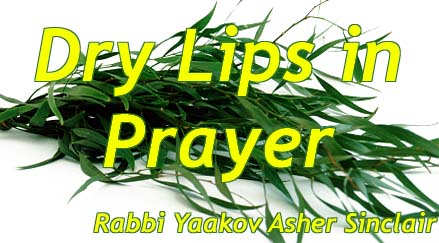Dry Lips in Prayer

The four species, the etrog, lulav, hadas and arava correspond to parts of the human body. The lulav is the spine; the etrog the heart; the hadas the eyes and the arava the lips.
The four species also correspond to four kinds of Jew: The etrog has both smell and taste. It represents the Jew who has both Torah and good deeds. The lulav, the palm, has taste but no smell. It represents the Jew who has Torah but not good deeds. The hadas, the myrtle, has a beautiful smell, but its fruit is tasteless. It corresponds to the Jew who has good deeds but not Torah. And the arava, the willow, has neither taste nor smell. The arava represents the Jew who has neither Torah nor deeds.
Which is why it is puzzling that of all the four species, we make the most fuss over the arava. We have a special day on Succot where the arava is the "star" — Hoshana Rabba. None of the other three species have the honor of a specific day of Succot on which they are remembered. Why is the arava, which represents the least of the Jewish People, celebrated above all the other species?
The message of the arava is that G-d loves our prayers. The lips of a Jew are his most precious possession. And even when our prayers seem dry and empty like the arava, when they come from a humble heart, G-d loves them, listens to them and accepts them.
Even from the dry lips of someone who is as lacking as an arava, G-d has nachat. Just as a parent loves the least of his children and takes pleasure when his child tries to please him, so too G-d loves the least of us and takes pleasure from our attempts to please Him, however dry and limited our attempts may be.
- Midrash Rabba Shemot 35:4
- Ohr Yaheil
- Rabbi Mordechai Perlman






